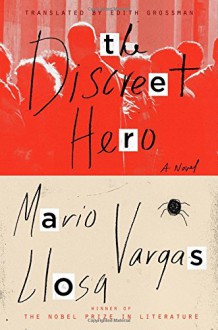
This book put me in a bind: while I found the story and characters engaging, fun, even, there are aspects that offended me. As I read, I would wonder: "Is this attitude or behavior endorsed by the author, or just described by him in depicting this place and these personalities?" By the end, I decided that there are definite ideologies at work here, including the beliefs that when it comes to family, blood is all; that the younger generation is responsible for squandering the hard work of their parents'; and the conservative viewpoint that if one only works hard enough, one can be successful. Other troubling attitudes that are questioned by characters but nevertheless feel condoned by the narrative: blaming victims of rape or sexual coercion; treating women as objects; racism; masculine pride as more important than the lives of loved ones.
After I finished the book, I read several reviews as I tried to work out my opinion of it. These mention that Vargas Llosa won the Nobel Prize for Literature but that this may not be his best work; that he used to be a social progressive but became a conservative who ran for president of Peru; that some characters appear in other books of his; that some elements are based on real events and his own life.
The book is divided between two alternating and converging narratives with separate protagonists, both fitting the "discreet hero" label of the title. The stories take place in two different areas of Peru, one Lima, one provincial, and their plots appear to have no connection. When they link up, it's very satisfying, even though the connection is quite minor. Each plot has elements of a mystery-thriller that propel the story; I found it hard to put down. The characters are often charming and easy to root for (until they're not). In story one, a man who worked his way up from nothing and owns a transport company is anonymously threatened unless he pays for protection; he refuses. In story two, a man on the verge of retirement and a long-awaited trip with his wife and son finds his life upheaved when his wealthy boss decides to marry his servant to punish his errant sons; at the same time, the protagonist's teenaged son is being approached by a mysterious stranger who may or may not be real, the devil, an angel, or just the kid fucking with his parents (this last mystery is left ambiguous).
Other elements I enjoyed included the relationship between the second protagonist and his wife, his feelings about art's role in life, the police sergeant from the first story, and learning about Peruvian life across two settings.

 Log in with Facebook
Log in with Facebook 







